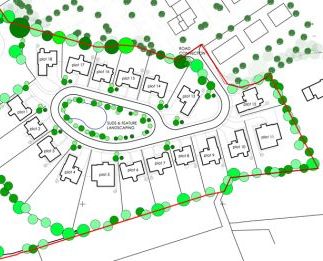Can we ever afford to have affordable housing again?
South Wales Evening Post - 3 September 2013
It was March 1976. Harold Wilson had just stepped down as prime minister, Brotherhood of Man were top of the charts and I had finally mastered walking on three-inch platforms shoes without looking like I had a hernia.
The pub door opened and in came my mate Phil to breathlessly announce that he and his girlfriend needed to get married sharpish. The rest of us exchanged knowing looks but it turned out the urgency was connected to his purchase of an old house in Morriston.
It was a different time and a different world. In those days you could get a sizeable cheque from the council for doing up an old property. Married couples were top of the queue. The same went for the council house waiting list. Phil put their names down for that as well, just in case.
Later that same year I bought my first house, a new build three bedroom, for just under £9,000. Phil and me had just become part of the property-owning democracy although it was still a few years before we would recognise the term.
Leap forward nearly four decades to the post sub-prime present and we have a situation where your average first-time buyer now needs to save for up to fifteen years before they can scrape together a deposit. What happened?
Somewhere between then and now, housing changed from a means of meeting social need to becoming an essential commodity. At the same time, a decent standard of accommodation went from something aspirational to an entitlement that eventually burst an all too fragile property bubble.

With all these competing social and financial forces at work, it’s no wonder that housing economics still feels so dysfunctional.
We all want affordable homes for our children and ourselves yet we regard ‘buoyant’ house prices as a good thing. No one breaks into smiles when energy prices go up, do they? (Except maybe the shareholders, I suppose). Why should housing be different?
I made this point to Assembly member Peter Black. We did our time together on Swansea Council and witnessed contemporary ideology make huge changes to the nature of housing provision.
His view, and I think I’m paraphrasing him correctly, is that what makes housing ‘affordable’ is the extent to which governments provide the right mix of subsidies and social incentives. I tend to agree.
Like many of my generation, I benefitted from something called MIRAS (Mortgage Interest Relief at Source). This gave tax relief on mortgage borrowing and was introduced by Labour chancellor Roy Jenkins in 1969 to encourage home ownership. It was abolished thirty years later by another Labour chancellor, Gordon Brown, who described it as “a middle-class tax perk”.
That’s the problem. Scratch a politician and there’s always a passionately held view on housing policy somewhere just beneath the skin. Sadly though, they all tend to be different. As a result, and for as long as I can remember, the housing game has been one of central governments making up new rules and everyone else chasing the money.
Michael Williams, chief executive of Gwalia Group, worries that the current emphasis on market affordability will obscure the need for a crucial link between housing and health. He makes the valid argument that there’s little point in providing a roof over someone’s head if they can’t afford to heat the property.
Since devolution, successive Welsh government ministers have striven to foster the principles of “hearth and home”. This month sees a relaxation in planning rules in Wales that will allow some house extensions to be constructed without the usual permission procedures.
At first sight it seems like a move in the right direction but I also hear concerns that the measures will probably see an increase in the number of households occupied by three generations and could end up concealing the true extent of ‘hidden homelessness’ in the community.
So what’s to be done? A scrutiny committee of Swansea Council has recently called for closer working with the Welsh Government and others to find innovative ways to increase the number of affordable houses. If ‘innovation’ means a more joined-up approach then I have a few tips to offer.
At present you can get a VAT refund for converting a commercial property into residential use but not if you want to improve a row of older houses. High land prices means the self-build industry is struggling and councils charged with producing Local Development Plans that foster sustainability have no practical way of delivering. Small changes in each area could make a big impact on overall affordability.
My mate Phil would probably say that it’s all just a matter of whatever the market will bear. Then again he now owns about eighty or so properties and lives in Marbella
I don’t subscribe to the notion that driving down prices by massively increasing the supply of new properties will sort things out. Nor do I think that the private sector can do it alone. A zero deposit doesn’t make a home affordable; it just creates another debt time-bomb.
There is no easy answer. It would be silly to pretend otherwise. But if we want to change things for the next generation then maybe we should start by asking when it was that banks started deciding housing policy in this country and not the government.